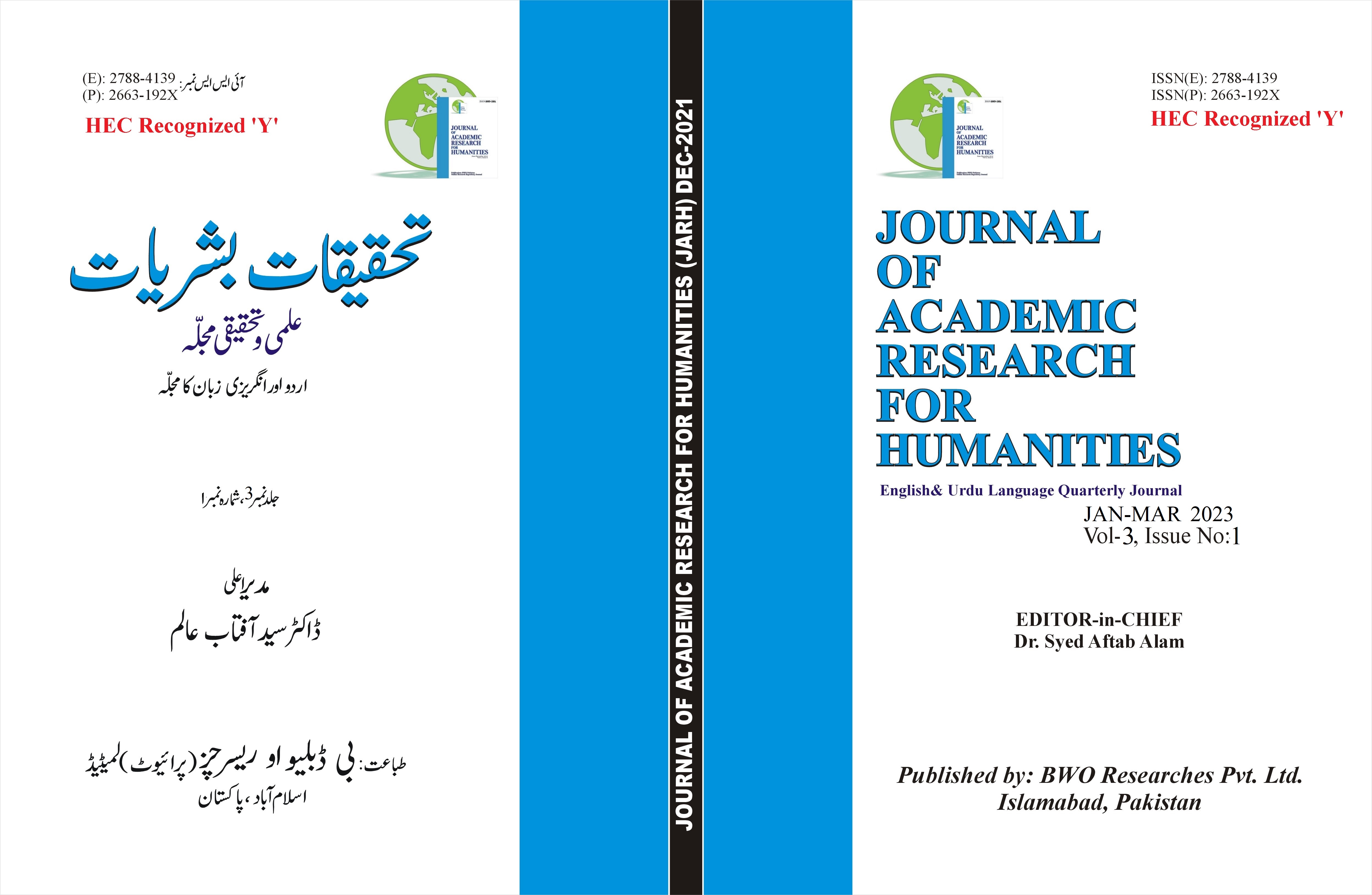A Proposed Curriculum Model of Ethical and Moral Education for Secondary Schools in Pakistan

Abstract
With the passage of time, we are finding an ever increasing crisis of ethical and moral behaviours in our society at large. Being the most effective way of modifying human character, education is assumed to be responsible for this phenomenon. Therefore, a critical analysis is direly needed to dissect the existing curriculum and identify the gaps for ethical and moral aspects and to provide suggestions for improving the situation. Thus, the present research has three major objectives; to explore the existing status of moral and ethical education at the secondary level in Pakistan, to identify the expected features of the proposed curriculum and to develop a curriculum model based on these findings. This phenomenological research, under a constructive paradigm has targeted people from all walks of life including teachers, students, policy makers, religious scholars and other stakeholders of education as the study population in Pakistan. Thirty-three participants were purposefully selected to administer a semi-structured interview, representative of both genders, urban and rural areas, uneducated, literate, or highly educated from all age groups from different parts of Pakistan. A rigorous thematic analysis of their interviews concluded that the existing curriculum for moral and ethical education is not being opted out efficiently and effectively at the secondary level. Based on the extracted themes, a curriculum model was suggested for the ethical and moral development of high school students to improve character building process of young adults.
Keywords
Moral and Ethical Education, Values, Secondary , School Education, Integration, Infusion theory
References
- Brady, L. (1990). Curriculum development. New Jersey, USA. Prentice Hall.
- Braun, V., & Clarke, V. (2006). Using thematic analysis in psychology. Qualitative research in psychology, 3(2), 77-101.
- Chou, C., & Tsai, C. C. (2002). Developing web-based curricula: Issues and challenges. Journal of curriculum studies, 34(6), 623-636.
- Costelloe, A. (2014). Learning for liberation, teaching for transformation: an education in prison prepare prisoners for active citizenship? Irish Journal of Applied Social Studies, 14(1), 4.
- Dube, B., & Cias, T. (2019). State-based curriculum making in a post-colonial Zimbabwe: Making sense of Family, Religious and Moral Education in a global context. Journal of Social Studies Education Research, 10(1), 241-258.
- Elihami, E. (2022). An innovation of character of Islamic religious studies education towards education 4.0 in Elementary School: Bibliometric Reviews. J. Basicedu Vol, 6(1).
- Gatawa, B. S. M. (1990). The Politics of The School Curriculum: An Introduction (Harare, College Press).
- Gunio, M. J. (2021). Determining the influences of a hidden curriculum on students’ character development using the Illuminative Evaluation Model. Journal of Curriculum Studies Research, 3(2), 194-206.
- Haase M., Raufflet E., Rudnicka A., Reichel J. (2013) Ethics Education. In: Idowu S.O., Capaldi N., Zu L., Gupta A.D. (eds) Encyclopedia of Corporate Social Responsibility. Springer, Berlin, Heidelberg.
- Ibeh, A. I. (2022). Curriculum Theory By Ralph Tyler And Its Implication For 21st Century Learning. UNIZIK Journal of Educational Research and Policy Studies, 52-61.
- Ismoilovich, I. M. (2021). Society is at a new stage of development priority in education system reform functions. European Journal of Research Development and Sustainability (EJRDS). Vol. 2 No. 7, pp.80-85
- Jong, H. M. (2022). Research on H. Taba's Curriculum Development Theory. Bulletin of Educational Research, 68(1), 75-113.
- Lunenburg, F. C. (2011). Curriculum development: Inductive models. Schooling, 2(1), 1-8.
- Mirzayevich, K. B. . (2022). The Role of Religious and Moral Values in Strengthening the Spiritual Development of Society and Individuals. European Journal of Life Safety and Stability (2660-9630), 15, 88-92.
- Osmani, M., Weerakkody, V., Hindi, N., & Eldabi, T. (2019). Graduates employability skills: A review of literature against market demand. Journal of Education for Business, 94(7), 423-432.
- Oxhandler, H. K., Polson, E. C., & Selman, S. (2022). Religion and Spirituality in MSW Programs’ Implicit and Explicit Curricula: A National Survey of Faculty. Journal of Social Work Education, 1-17.
- Peel, K. L. (2020). A beginner's guide to applied educational research using thematic analysis. Practical Assessment, Research, and Evaluation, 25(1), 2.
- Pellegrino, J. W., Chudowsky, N., & Glaser, R. (2001). Knowing what students know: The science and design of educational assessment. National Academy Press, 2102 Constitutions Avenue, NW, Lockbox 285, Washington, DC 20055.
- Richardson, N. (2022). Religion, schooling and conflicting nationalisms: Educational perspectives from Northern Ireland. Journal of Religious Education, 70(3), 273-285.
- Senah, K. E. (2007). Core curriculum guide for strengthening morals and values education in educational institutions in Trinidad and Tobago/prepared by Emmanuel Kwaku Senah, Curriculum Development Division, Ministry of Education, Republic of Trinidad and Tobago [Ed. draft 2006].
- Singer, P. (2020). Famine, Affluence, and Morality. In Global Justice (pp. 15-31). India, Routledge.
- Stefkovich, J. A., & Frick, W. C. (2021). Best interests of the student: Applying ethical constructs to legal cases in education. The UK. Routledge.
- Stenhouse, L. (1975). Defining the curriculum problem. Cambridge Journal of Education, 5(2), 104-108.
- Thambu, N., Prayitno, H. J., & Zakaria, G. A. N. (2021). Incorporating active learning into moral education to develop multiple intelligences: A qualitative approach. Indonesian Journal on Learning and Advanced Education (IJOLAE), 3(1), 17-29.
- Turner III, D. W., & Hagstrom-Schmidt, N. (2022). Qualitative interview design. Howdy or Hello? Technical and Professional Communication. The Qualitative Report 15, no. 3 (2010): 754-760.
- Walker, D. F. (1971). A naturalistic model for curriculum development. The school review, 80(1), 51-65.
- Walker, D. F. (2022). Curriculum Deliberation. London, Routledge.
- Williams, H. (2021). The Meaning of" Phenomenology": Qualitative and Philosophical Phenomenological Research Methods. The Qualitative Report, 26(2), 366-385.
- Yusuf, H. O. (2013). Promoting peaceful co-existence and religious tolerance through supplementary readers and reading comprehension passages in the basic education curriculum. International Journal of Humanities and Social Science, 3(8), 224-232.